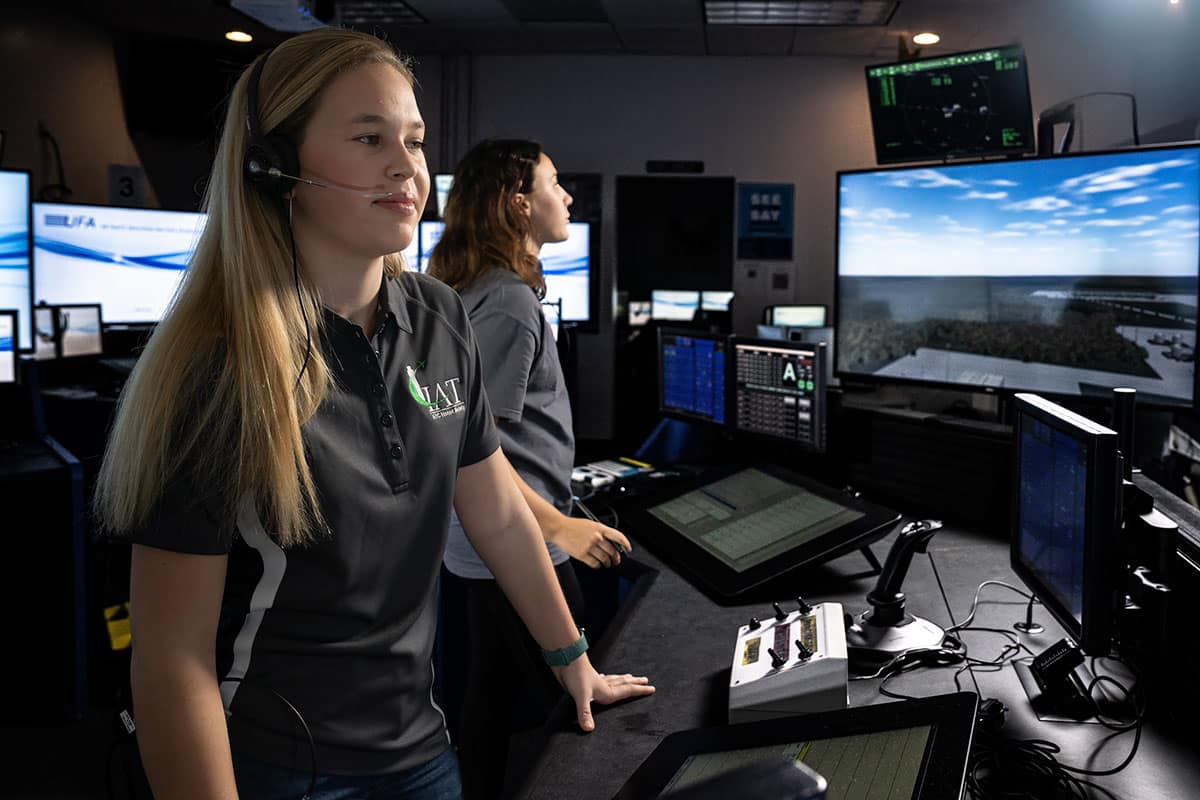First Embry-Riddle Students Set for Immediate Air Traffic Controller Employment Through New FAA Hiring Path

The first cohort of students in Embry-Riddle Aeronautical University’s air traffic control program is on track to bypass the Federal Aviation Administration Academy and head straight to FAA facilities for controller training.
This more direct path was made possible after Embry-Riddle signed an agreement with the federal agency late last year for a critical new training initiative to allow the hiring of air traffic controllers from approved university programs.
Four students have begun the testing process, which includes a written exam and evaluations in simulators at Embry-Riddle’s newly enhanced air traffic control labs on the Daytona Beach, Florida, campus. The FAA has certified two faculty members in Embry-Riddle’s Air Traffic Management (ATM) program to evaluate the students, who are on track to complete testing before they graduate in May.
Announced in February 2024, the Enhanced Air Traffic-Collegiate Training Initiative (AT-CTI) lets students bypass training at the FAA’s academy in Oklahoma City, provided they pass the same rigorous evaluations. Embry-Riddle is one of the first three universities to begin evaluating students through the Enhanced AT-CTI program, according to an FAA spokesman.
Benefitting Students, the Controller Workforce

Students learn and practice critical communications and aircraft handling skills. (Photo: Embry-Riddle/Bill Fredette-Huffman)
Students who pass the testing may be sent directly to air traffic control facilities for further training, as long as they have also passed the Air Traffic Skills Assessment (ATSA) exam and meet medical and security requirements.
“Whereas previously it would take one to two years for students to go through the process post-graduation, now they are able to enter into the workforce immediately,” said Dr. Mike McCormick, associate professor and Air Traffic Management program director at Embry-Riddle’s Daytona Beach Campus.
McCormick said that 26 Embry-Riddle students are currently on course to be assessed by the end of the Fall 2025 semester and that the number will continue to grow.
Kyra Hanson, a senior in the Air Traffic Management program who is part of the first Embry-Riddle cohort to take part in the Enhanced AT-CTI initiative, said she has been “putting in the hours” and that faculty “have been very attentive to students” in the program.
“I think I have been given an amazing opportunity, and I am on the right track to be successful. The ability to get that time back and go straight into the workforce is a dream,” Hanson said.
“Embry-Riddle is proud that these talented students are on track to have an immediate impact in strengthening the controller workforce,” said Embry-Riddle President P. Barry Butler, Ph.D. “Thanks to our leading Air Traffic Management program, they are well prepared to help safeguard our nation’s aviation system and the flying public.”
Supporting the ‘Hiring Supercharge’
In recent years, the FAA has made an effort to boost the hiring of air traffic controllers. The agency hired 1,500 controllers in 2023 and more than 1,800 in 2024. In February, FAA officials announced an air traffic controller “hiring supercharge.”
Robert Sumwalt, former National Transportation Safety Board (NTSB) chairman and executive director of the Boeing Center for Aviation and Aerospace Safety at Embry-Riddle, said that “it’s essential to have Enhanced AT-CTI programs like the one at Embry-Riddle to improve air traffic controller staffing and contribute to the safety of our national airspace.”
To earn approval for the Enhanced AT-CTI program, Embry-Riddle’s Air Traffic Management program underwent an extensive audit by the FAA to verify that it delivers the same high-level curriculum and simulators as the agency’s academy.

Embry-Riddle recently upgraded its air traffic control labs with the latest simulator technology. (Photo: Embry-Riddle/Bill Fredette-Huffman)
Cutting-Edge Simulator Technology
This January, Embry-Riddle upgraded its air traffic control training labs with the latest in simulator technology.
Provided by industry leader UFA, the system offers an “all-in-one” air traffic control training platform that employs 270-degree control tower simulations with high-fidelity visualizations, state-of-the-art radar controller suites and AI-enhanced speech recognition for real-time pilot interactions, according to a UFA news release.
The new simulator system provides an “immersive, dynamic, air traffic environment,” which meets and even exceeds the latest capabilities at the FAA’s training academy, McCormick said.
“Students feel as if they are working live air traffic and look, think and act as a professional air traffic controller,” he said.
A Continuing Legacy of Excellence
The Air Traffic Management program at Embry-Riddle’s Prescott, Arizona, campus is now upgrading its simulation system and will soon undergo an FAA audit for inclusion in the Enhanced AT-CTI program. The program has 43 students and is the largest minor at the campus.
“There is clearly an increased demand for air traffic control specialists nationwide. Embry-Riddle can help to meet this need by producing qualified and skilled candidates through elite training at our location in the West,” said Kyle Wilkerson, assistant professor and program chair of Air Traffic Management at the Prescott Campus.
Embry-Riddle’s Air Traffic Management program at the Daytona Beach Campus has 122 students pursuing bachelor’s degrees and 148 students minoring in the program. All of the students are eligible for the Enhanced AT-CTI program.
Dr. Alan Stolzer, dean of the College of Aviation at the Daytona Beach Campus, said the Air Traffic Management program combines highly experienced faculty, cutting-edge simulation and rigorous curricula to prepare students for today’s complex air traffic control environment. Graduates enter the workforce with comprehensive knowledge of the national airspace system, he said.
“They consistently demonstrate reliability and excellence, actively contributing to air traffic operations at a broad range of FAA facilities — from regional airports to the nation’s busiest air traffic centers,” Stolzer said.
